Business
NCDMB, FIRS Offer Tax Incentives For Oil Industry R&D Investments
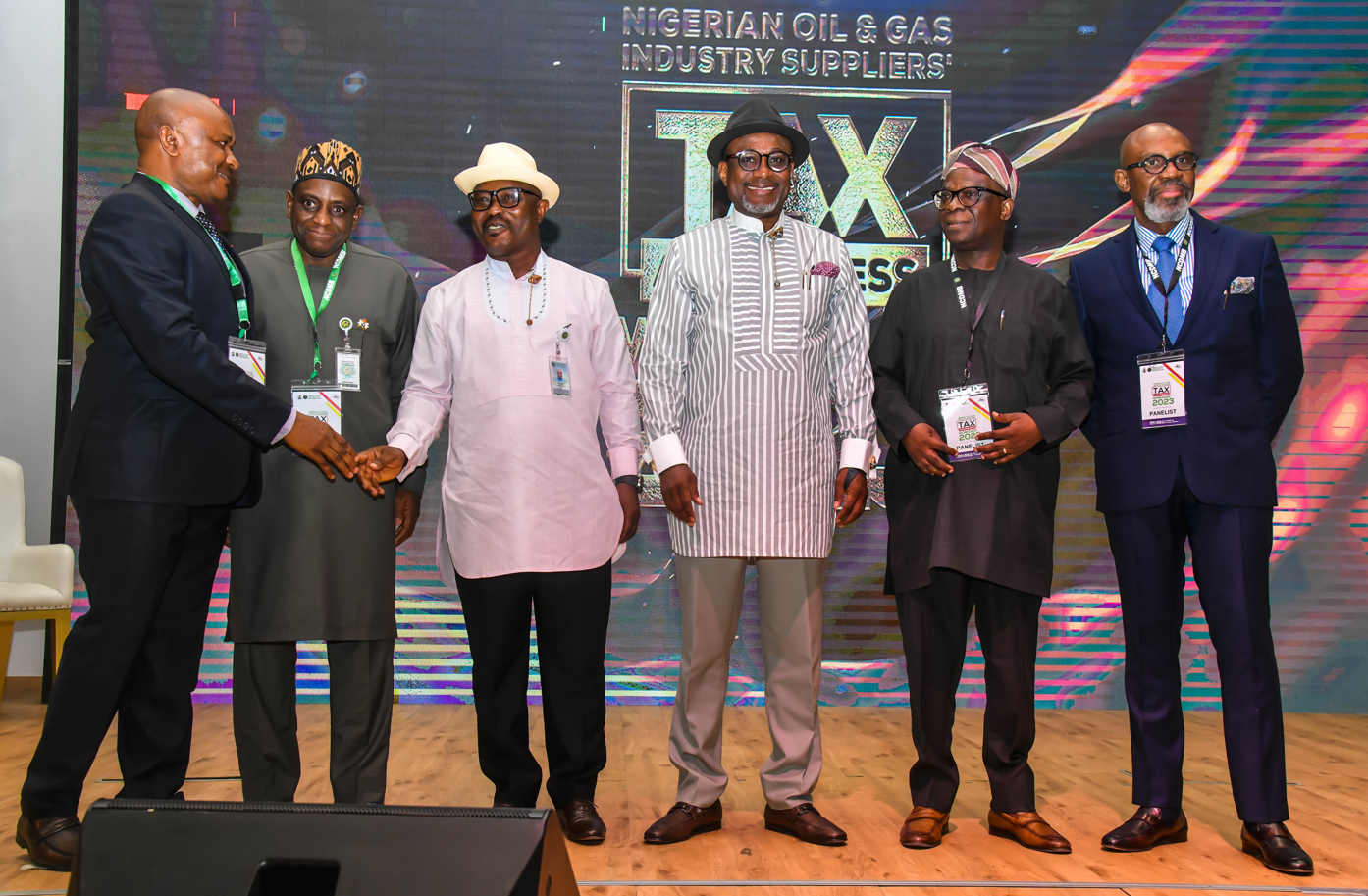
Modupe Asudo
Oil and gas companies desirous to reduce their tax burden and grow profitability should consider increasing investments in research and development (R&D), with a view to taking advantage of the incentives provided in existing fiscal laws, the Nigerian Content Development and Monitoring Board (NCDMB) and the Federal Inland Revenue Service (FIRS) have canvassed.
The Executive Secretary, NCDMB, Engr. Simbi Kesiye Wabote and the Executive Chairman, Federal Inland Revenue Service (FIRS), Mr. Muhammad Nami stated this on Tuesday in Yenagoa, Bayelsa State, at the one-day Nigerian Oil and Gas Industry Suppliers’ Tax Awareness Workshop jointly organized by the two organizations at the NCDMB Conference Hall.
Delivering the keynote address at the event, the Executive Secretary NCDMB stated that the Finance Act 2021 and other extant tax codes relating to Research and Development provide attractive tax incentives for oil and gas firms that invest in R&D.
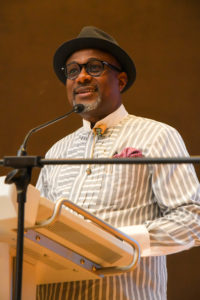
Executive Secretary NCDMB, Engr. Simbi Kesiye Wabote speaking at the one-day Nigerian Oil and Gas Industry Suppliers’ Tax Awareness Workshop jointly organized by the NCDMB and FIRS on Tuesday in Yenagoa.
He hinted that many oil and gas companies were oblivious of the opportunities that exist within Nigerian tax laws for the oil industry to harness from investing in Research and Development. He reiterated that such workshops provide the necessary education and enlightenment that enable businesses to position themselves appropriately to benefit from making R&D an integral part of their business model.
He observed that the low level of R&D funding by private companies is partly linked to inadequate information. He regretted that “the consequence is not only significant capital flight in the acquisition of technology required for oil and gas projects and operations, but also players in the sector are tied to the apron and direct control of the foreign supply chain who control the technological advances arising from their R&D activities.”
Wabote cited examples of leading Fortune 500 companies that commit between 5- 10% of their annual budgets to R&D, which enables them to produce innovative products and make significant tax returns to the Government and create huge employment opportunities.
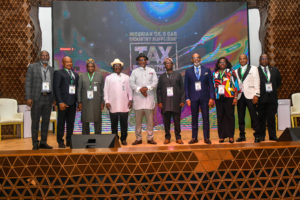
L-R: (3rd left) General Manager Planning, Research and Development, Nigerian Content Development and Monitoring Board (NCDMB), Alhaji Abdulmalik Halilu; Director, Planning, Research and Statistics, NCDMB, Mr. Daziba Patrick Obah; Executive Secretary, NCDMB, Engr. Simbi Kesiye Wabote and (7th left); member NCDMB Governing Council, Mr. Mina Oforiokuma and other speakers at the one-day Nigerian Oil and Gas Industry Suppliers’ Tax Awareness Workshop jointly organized by NCDMB and Federal Inland Revenue Service (FIRS) on Tuesday in Yenagoa, Bayelsa State.
Speaking further, the NCDMB boss expressed hope that the workshop will change the gross underfunding of research in Nigeria, which is currently estimated at less than 0.2% of the national budget. He insisted that operators can no longer neglect R&D, insisting that it is key to local content development, enhancement of future tax revenue to Government, development of home-grown solutions and retention of industry spending within Nigerian financial institutions.
He remarked that “that access to the Nigerian Content Intervention Fund by the local supply chain has been one of the major contributors to the growth in local content level from less than 5% in 2010 to 54% in 2022.”
He hinted that the Board is “pushing for similar performance in Research and Development by sharpening our focus on the various elements that will enable the growth and appreciable impact of research and development in our economy.”
The Executive Secretary identified funding as one of the key pillars of R&D, and that informed the launch of the $50 million Nigerian Content Research & Development Fund to drive strategic programmes and developments in the R&D ecosystem.
He however insisted that Government should not be the sole financier of R&D, pointing out that “the bulk of R&D funding should come from the private sector who are business owners and will ultimately benefit directly from the research outcomes.”
The Executive Secretary affirmed that the conference was organized in line with Section 70 of the Nigerian Oil & Gas Industry Content Development Act 2010 which mandates NCDMB to organize conferences and other public education fora to develop local content in the Nigerian oil and gas industry.
He added that the Board is leveraging the Enabling Business Environment pillar of its 10-year Strategic Roadmap, to collaborate with the FIRS in creating a platform for engaging oil and gas industry stakeholders, with a view to highlighting the inherent benefits of investing in R&D, for the private sector and government entities.
In his remarks, the Executive Chairman, Federal Inland Revenue Service, Mr. Muhammad Nami reiterated that “Research and Development (R&D) have been identified as a veritable means for companies that want to remain competitive and profitable in today’s rapidly changing business environment.”
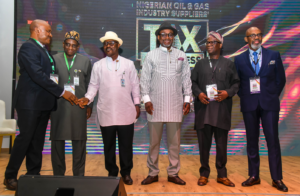
L-R: (2nd left) General Manager Planning, Research and Development, Nigerian Content Development and Monitoring Board (NCDMB), Alhaji Abdulmalik Halilu; Director, Planning, Research and Statistics, NCDMB, Mr. Daziba Patrick Obah; Executive Secretary, NCDMB, Engr. Simbi Kesiye Wabote and (6th left); member NCDMB Governing Council, Mr. Mina Oforiokuma and other speakers at the one-day Nigerian Oil and Gas Industry Suppliers’ Tax Awareness Workshop jointly organized by NCDMB and Federal Inland Revenue Service (FIRS) on Tuesday in Yenagoa, Bayelsa State.
Nami who was represented by his Senior Special Assistant, Mr. Gabriel Ogunjemilusi provided details on Federal Government’s tax regime, incentives, and related facts. He stated that: “Allowable deduction of up to 10% of amount of reserve made out of the profits of a period by a company for research and development: claim of capital allowance on capital expenditure on plant and machinery used for R&D activities; pioneer status tax holiday for R&D Companies; companies and other organizations that invest in R&D facilities for commercialization can claim a tax credit of up to 20% of the cost of their qualifying expenditures.”
He assured participants that the Federal Inland Revenue Service (FIRS) will continue to support all companies in Nigeria to take advantage of available fiscal incentives provided by the Nigerian tax laws.
The Workshop attracted renowned finance and legal experts who spoke on “Provisions of the NOGIC Act on R&D, R&D Operating Model and Imperatives on Success,” “Royalty Potentials from R&D Investments,” and “Constraints of Investing and Way Forward.”
Business
PETROAN Commends Sustained Run Of P’Harcourt Refinery
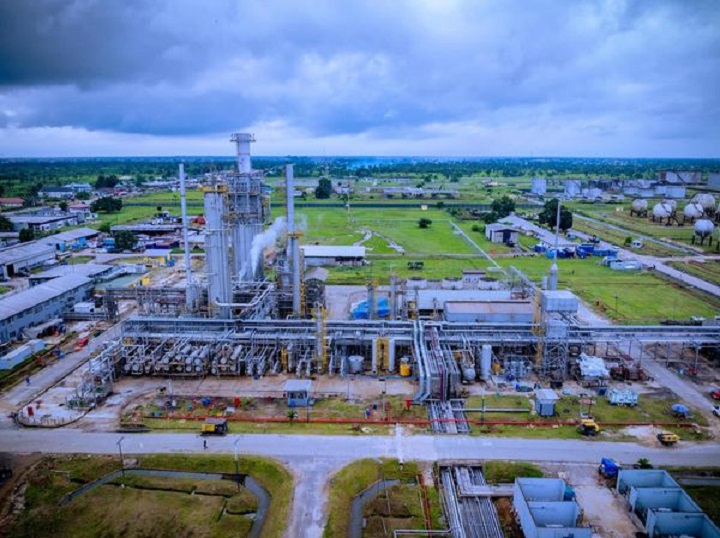
The unbroken run of the Port Harcourt Refining Company (PHRC) has been commended by a relevant stakeholder.
The Petroleum Products Retail Outlets Owners Association of Nigeria (PETROAN) gave kudos to the Nigerian National Petroleum Company Limited (NNPC Ltd) and others for the continuous operations of the refinery since October 2024.
Biztellers reports that the PHRC, which was dormant for over 20 years, was revamped with a loan provided by the Afreximbank. Revamping the PHRC was carried out by Tecnimont Nigeria Limited, a subsidiary of the Maire Tecnimont Group.
The PETROAN through a statement by its Publicity Secretary, Joseph Obele, has come out to praise Tecnimont Nigeria Limited “for their professionalism and expertise in delivering a world-class rehabilitation project.”
The host communities were also commended by the PETROAN, which noted their cooperation and support during the rehabilitation process.
ALSO READ: Gateway Games Will Inspire More Sports Stars In Nigeria – Abiodun
In the statement, the PETROAN noted thus, “The refinery, which was commissioned in October 2024, has been running continuously for 180 days, up to March, a remarkable feat that underscores the effectiveness of the rehabilitation project.”
Consequently, the “PETROAN is pleased to note that its members are currently loading diesel and kerosene from the refinery, while NNPCL retail marketers are loading PMS. This development has not only ensured a steady supply of petroleum products but has also helped to eliminate the circulation of fake kerosene and diesel in the market.”
The PETROAN also lauded the managing director of the Port Harcourt Refining Company, Ibrahim Onoja, for his dedication to ensuring the successful rehabilitation and operation of the refinery.
Higher authorities, including “President Bola Tinubu, for making funds available for the rehabilitation of the refinery; the Minister of State for Petroleum Resources (Oil), Senator Heineken Lokpobiri, for his supervision and guidance throughout the rehabilitation process; the Group Chief Executive Officer of NNPCL, Mele Kyari, for his leadership and commitment to the project; and the Managing Director of NNPC Retail Ltd, Hubb Stockman, for the effective marketing of all the products from the refinery,” were also commended by the PETROAN.
Industry regulator, the Nigerian Midstream and Downstream Petroleum Regulatory Authority (NMDPRA) was also lauded by the PETROAN for its regulatory oversight and support in ensuring the safe and efficient operation of the refinery.
Business
Nigeria Exports Over 2m Barrels Of Jet Fuel To US

Evidence of the growing influence of the Dangote Petroleum Refinery & Petrochemicals has manifested far beyond Africa and the Middle East, with the United States having imported over two million barrels of jet fuel from the Nigerian based refinery in March.
According to experts, this development should bring immense joy to Nigerians, as it attests to the unparalleled quality of the refinery’s products and the trust that the international community places in the world’s largest single-train refinery.
Going by data from ship-tracking service Kpler, six vessels carrying around 1.7 million barrels of jet fuel from the Dangote Petroleum Refinery arrived at US ports this month.
It was gathered that another vessel, the Hafnia Andromeda, is set to arrive at the Everglades terminal on 29th March with approximately 348,000 barrels of jet fuel.
ALSO READ: NDSF Torch Brightens Edo State
The shipments from the Dangote Refinery, with a capacity of 650,000 barrels per day (bpd) — Africa’s largest — highlight its potential to reshape global fuel trading dynamics, establishing a new swing supplier in the Atlantic Basin.
Biztellers reports that this shipment to the United States follows three cargoes of jet fuel, totalling around 130 million litres, exported from Nigeria to Saudi Arabia by the Dangote Petroleum Refinery.
The refinery has already demonstrated its ability to compete with European refiners on gasoline (PMS) exports, and these jet fuel shipments to the United States could challenge the economics of domestic producers in the world’s largest fuel-consuming nation.
According to Chief Operating Officer of TankTiger, Steven Barsamian, “the surge in demand, partly driven by the influx of supply from Nigeria, is expected to lower jet fuel prices in the US ahead of the peak summer travel season. US jet fuel imports from Dangote Refinery are expected to decrease aviation fuel prices during this period, according to trade analysts and storage brokers. US jet fuel imports in March have averaged around 226,000 bpd, the highest since February 2023, underlining the global demand for products from Dangote Refinery.”
The Dangote Refinery, which commenced production in January 2024, has already exported its products to almost every continent. While the surge in US imports was partly triggered by a maintenance-related shutdown at the Phillips 66 Bayway refinery in New Jersey, analysts believe the choice of Dangote’s products highlights its growing presence in international markets, having successfully competed with European refiners in gasoline exports.
Economist and Chief Executive Officer of the Centre for the Promotion of Private Enterprises (CPPE), Dr Muda Yusuf, stated that the export of jet fuel to the United States by Dangote Refinery is a point of pride for Nigeria, highlighting the quality, standard, and the trust that the international community places in the refinery.
“Nothing could be more prideful for us as a country than the fact that we now have a refinery producing products that can be exported to the United States. It speaks to the quality, standards, and trust that international communities have in Dangote Refinery, because these are markets that don’t compromise on quality. They have stringent standards, and if they deem it worthy to import from Nigeria, it is a source of great pride,” he said.
On his part, the former Director-General of the Lagos Chamber of Commerce and Industry (LCCI) also emphasised that Dangote Refinery is enhancing Nigeria’s position on the global stage and should be supported by both citizens and the government.
“That is why all of us—citizens and the government — should do everything to support the refinery, as it is breaking many barriers and boosting our country’s reputation. The lesson here is that we should support the Dangote Refinery and other refineries with similar capacities, as they can provide us with significant leverage,” he added.
Similarly, Public Policy Expert, Dr Abimbola Oyarinu, stated that the Nigerian economy would be in a better state today if the country had functional refineries in the past, rather than just exporting crude oil while importing refined petroleum products.
“This is something that should have been addressed since 2014. Things wouldn’t have reached this point—such as high inflation and unemployment—if we had a functioning refinery. However, both the government and the people failed to take action until Dangote stepped in with significant investment. The Dangote Refinery is not only reducing foreign exchange outflow, but it is also bringing in foreign exchange. It is unfortunate that despite this, some elites and those in power are still intent on sabotaging the refinery and Dangote himself,” he said.
The university lecturer also warned that the lack of ease in doing business and the frustration of local investments could discourage future investors.
“This is something the country should be proud of. We previously had a mono-economy, reliant solely on oil exports, but Dangote has helped diversify the sector by selling finished products to international markets. However, which investors would want to invest in Nigeria after seeing what Dangote is going through?” he queried.
Business
Sustainability: CDP Rates Dangote Cement High On Climate Change, Water Security
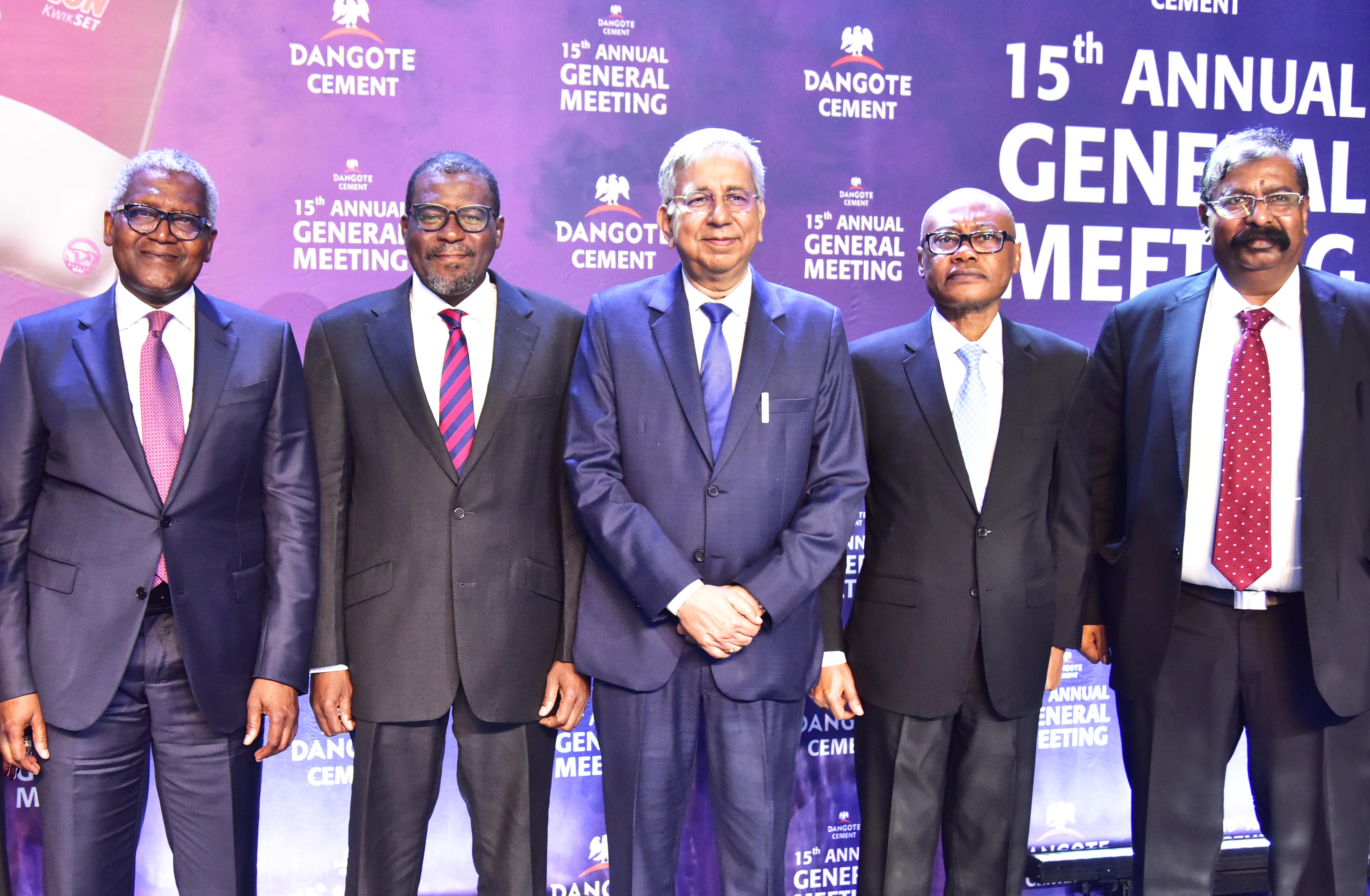
The Dangote Cement Plc (DCP) has achieved a ‘B’ score in climate change and water security disclosures according to the recently released 2024 Carbon Disclosure Project (CDP) results.
The CDP is the world’s largest, most comprehensive dataset on environmental action which empowers investors, companies, cities, and national and regional governments to make earth-positive decisions.
It was gathered that Dangote Cement has disclosed its environmental practices annually through the CDP since 2018.
On its part, the CDP provides a voluntary framework for companies to report on Climate, Water Security, and Forests. It rigorously evaluates corporate environmental performance, assigning scores from A to D based on companies’ transparency, governance, and measurable actions towards sustainability. Following the release of company scores in February, Dangote Cement’s score on water security which was C was upgraded to B. Similarly, the company’s commitment to supporting a climate resilient future was also demonstrated in its climate change score of B in 2024.
ALSO READ: ADF Spreads Palliatives To 10 States
On the new rating, Managing Director/Chief Executive, Dangote Cement, Arvind Pathak, said, “Dangote Cement leads in Africa as one of few businesses in six states and regions of Africa to disclose through CDP.”
He further stated that “the 2024 score is an outcome of ongoing efforts to reduce our carbon footprint, accelerate climate action and promote sustainability across our business and its value chain.”
On his part, the Head, Sustainability, Dangote Cement, Dr. Igazeuma Okoroba, expressed gratitude to all stakeholders who aligned with the Group’s Environmental, Social, and Governance (ESG) strategy overseen by the company’s Board which supported the achievement of an improved rating this year.
She asserted that “this year’s results are evidence that our contribution to create a world where people, planet and profit are truly balanced is paying off.”
Affirming the company’s commitment to decarbonisation, Dr Igazeuma stated that “Although this year’s score demonstrates our transparency on sustainability, DCP’s goal is to go beyond disclosure and take meaningful action through tangible solutions, innovations, and projects to close the gap between ambition and reality.”
Dangote Cement Plc is sub-Saharan Africa’s largest cement producer with an installed capacity of 45.6Mta across 10 African countries and operates a fully integrated “quarry-to customer” business with activities in manufacturing, sales, and distribution of cement. The company is on track to meet its decarbonisation targets through energy efficiency measures, adoption of supplementary cement materials, carbon offsets and other sustainable practices.














